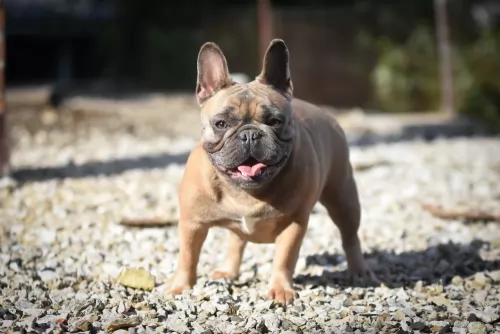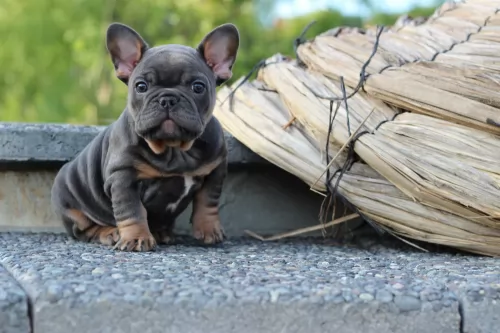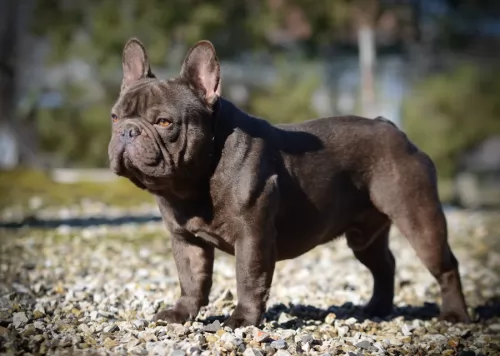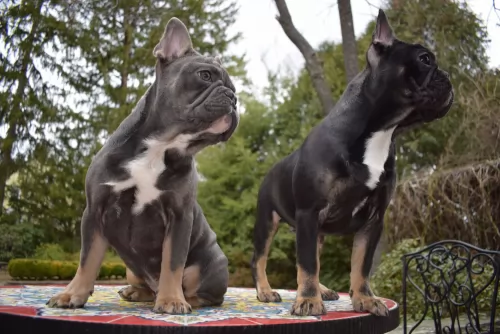 Petzlover
Petzlover French Bulldog is originated from France but Dalmatian is originated from Croatia. French Bulldog may grow 26 cm / 10 inches shorter than Dalmatian. French Bulldog may weigh 18 kg / 39 pounds lesser than Dalmatian. French Bulldog may live 3 years less than Dalmatian. French Bulldog may have less litter size than Dalmatian. Both French Bulldog and Dalmatian requires Low Maintenance.
French Bulldog is originated from France but Dalmatian is originated from Croatia. French Bulldog may grow 26 cm / 10 inches shorter than Dalmatian. French Bulldog may weigh 18 kg / 39 pounds lesser than Dalmatian. French Bulldog may live 3 years less than Dalmatian. French Bulldog may have less litter size than Dalmatian. Both French Bulldog and Dalmatian requires Low Maintenance.
 The french bulldog originated in England and are bred expecting small size bulldogs. Many lace workers in Nottingham had little bulldogs and when they emigrated to france, they brought their dogs with them. Soon they become popular in France and Europe. Then Americans showed interest in them.In 1896 frenchie was shown in United states in a show and after that they got their nickname "Frechie".
The french bulldog originated in England and are bred expecting small size bulldogs. Many lace workers in Nottingham had little bulldogs and when they emigrated to france, they brought their dogs with them. Soon they become popular in France and Europe. Then Americans showed interest in them.In 1896 frenchie was shown in United states in a show and after that they got their nickname "Frechie".
 The history of the Dalmatian dog is also fairly scant, and the information you get is often unclear.
The history of the Dalmatian dog is also fairly scant, and the information you get is often unclear.
The name Dalmatian wasn’t used until the end of the 18th century, although it seems as though, according to murals on ancient tombs, there were white hounds then with specks over the body.
It does seem firm that the modern Dalmatian is because of breeding of the English nobility. They used these dogs to accompany them on their carriages. The dogs were also bred with the purpose of getting an exquisite spotted pattern.
It was in 1890 that the first Dalmatian Club was established in England and the dog was recognized by the American Kennel Club in 1888.
 Frenchie is a good companion dog and has a powerful muscular body. They like to play but also likes to relax for more time. They are intelligent and training them is very easy until they think it a game. They are free thinkers and are not very good in obedience. Frenchies should not be leaved alone for a long time.They love spending time with humans and generally they get along with everyone. They are excellent watchdogs and alerts when strangers come.
Frenchie is a good companion dog and has a powerful muscular body. They like to play but also likes to relax for more time. They are intelligent and training them is very easy until they think it a game. They are free thinkers and are not very good in obedience. Frenchies should not be leaved alone for a long time.They love spending time with humans and generally they get along with everyone. They are excellent watchdogs and alerts when strangers come.
French bulldog suits very well in apartments. But they should be made to walk for fifteen minutes daily to avoid over weight. They should not be kept outside on hot days. Frenchies will be very happy if you stay in home. They will follow you wherever you walk inside the house. They love people so much, such that people who own a Frenchie can not imagine life without them.
 The Dalmatian is a medium sized dog with its beautiful white coat with black or liver spots being its main feature. The coat is short and dense and the Dalmatian pretty much sheds all year round.
The Dalmatian is a medium sized dog with its beautiful white coat with black or liver spots being its main feature. The coat is short and dense and the Dalmatian pretty much sheds all year round.
It is notable that at birth, the puppies are pure white, with their spots starting to form about 4 weeks later.
Both the male and female stand at anything between 56–61cm in height and weigh between 22 to 35kg. He is a slender, muscular dogs with plenty of stamina. The ears of the dog are floppy, he has brown eyes and a long tail.
With his human family, the Dalmatian is an active, playful dog. He has the reputation of being somewhat unfriendly and aloof, but many who have kept him as a pet say this isn't so. He loves to take part in games and gets on well with children in the home.
He is intelligent, but when it comes to strangers, the Dalmatian is reserved and even aloof. If you want to get the best from your Dalmatian, make sure that he is trained and socialized as he then knows how to behave well around people. He makes a good watchdog too.
 They are good children friendly dogs as they like to play with them. It will be good if they are supervised by an adult.
They are good children friendly dogs as they like to play with them. It will be good if they are supervised by an adult.
They are polite with everyone including other pets. They love to play games and chase balls but don't need much exercise.
Frenchies adapts well for apartment living but they don't like being alone for long time. They will not tolerate both hot and cold weather and so air conditioning will be better.
French Bulldogs are easy to train and are very much interested in playing.
 The Dalmatian is such a beautiful dog, energetic and playful and he is good with pets and children in the home.
The Dalmatian is such a beautiful dog, energetic and playful and he is good with pets and children in the home.
He is intelligent too and training and socialization for him will be easy and promise to bring out all his good points.
The Dalmatian became popular in the 1800's when they were used as coach-dogs, and their popularity has been enhanced because of films from Hollywood such as ‘101 Dalmatians’.
Unfortunately many people receive Dalmatian puppies as gifts after seeing movies like this and then hand their dogs into rescue centers when they grow up and are no longer the cute little puppy they first met.
Be a responsible dog owner. A Dalmatian has feelings and you need to commit to caring for him for up to 15 years. You’ll be rewarded by having a wonderful, loyal canine friend.
 Frenchies can suffer from Von Willebrand's disease(VWD)and thyroid condition. Due to their flat faces they suffer from elongated soft palate or cleft palate. Because of their compacted air way they have inability to effectively regulate temperature.
Frenchies can suffer from Von Willebrand's disease(VWD)and thyroid condition. Due to their flat faces they suffer from elongated soft palate or cleft palate. Because of their compacted air way they have inability to effectively regulate temperature.
Any indication that the hair is unhealthy, such as brittleness and hair loss, should be addressed immediately to avoid any further damage. Hair loss becomes a problem when it becomes excessive, possibly due to disease or a particular condition.
 Dalmatians, with good care, can live to be about 10 to 15 years. However, just as with other breeds, the Dalmatian is prone to certain health problems that are more specific to their breed. Some of these problems are skin allergies, deafness and urinary stones.
Dalmatians, with good care, can live to be about 10 to 15 years. However, just as with other breeds, the Dalmatian is prone to certain health problems that are more specific to their breed. Some of these problems are skin allergies, deafness and urinary stones.
Dalmatians are known to have sensitive skin and they are prone to topical allergies. When you brush your dog, you should check his skin for redness and also check for fleas and ticks.
Red bumps on his skin could mean an allergy and can be distressing for your pet. Your pet may be scratching excessively and the skin may be red and moist with runny, itchy eyes. It is time to get your dog to the vet, who may prescribe an antihistamines to get the itching and allergies under control.
Unfortunately, the Dalmatian is a dog which has a tendency to form stones in the kidneys and bladder. A genetic mutation causes the raised uric acid levels which is more prevalent with the male Dalmatian. Straining to urinate can be tremendously stressful for your dog and you will need to get him to the vet immediately.
 As with all dogs, proper nutrition makes your French Bulldog a happy, healthy pup. He should have his own food and water bowls. Don't feed your French bulldog puppy, uncooked meat or food that may have gone bad. Young puppies need relatively large amount of food in order to meat the demands of their rapidly growing bodies and their hectic lifestyle. Feed your puppy specially designed chewing treats from reputable pet stores.
As with all dogs, proper nutrition makes your French Bulldog a happy, healthy pup. He should have his own food and water bowls. Don't feed your French bulldog puppy, uncooked meat or food that may have gone bad. Young puppies need relatively large amount of food in order to meat the demands of their rapidly growing bodies and their hectic lifestyle. Feed your puppy specially designed chewing treats from reputable pet stores.
According to the French BullDog Club of America, there are no specific guidelines for feeding them. Options for feeding your French Bulldog are commercial dry food, canned food, raw food and homemade meals. Calories required for frenchie varies depending on size, age, activity level and metabolism.
Frenchies can be made to walk or run for a particular distances. Heavy exercises should not be given as they face respiratory problems. Avoid exercising them in hot weather as they have chances of getting heatstroke.
 The Dalmatian is an easy dog to maintain and brushing twice a week will get rid of loose hairs. What is notable with the Dalmatian is that not only does he look like a well groomed dog, he also doesn’t have that typical dog smell around him.
The Dalmatian is an easy dog to maintain and brushing twice a week will get rid of loose hairs. What is notable with the Dalmatian is that not only does he look like a well groomed dog, he also doesn’t have that typical dog smell around him.
No matter what kind of dog you have, a high-quality dog food is always beneficial for your dog’s health. Home-made food is always good for your dog and wholesome food such as brown rice, vegetables and some cooked chicken will delight your pet and keep him interested in his food.
There are also excellent manufactured foods and kibble is a good food to have when you select it according to your dog’s age and energy levels.
These foods, especially the top quality ones, ensure your pet gets all the nutrients he needs. Adding some raw meat into the diet can be highly beneficial for your pet and will keep him bright eyed, bushy tailed and with a wet nose.